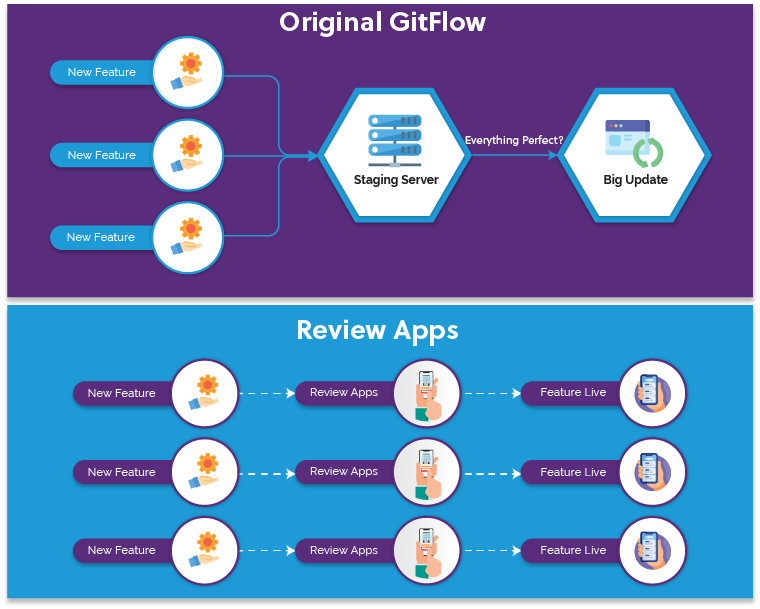We consider review apps as one of the most useful ways to enhance software development within a company, streamline development, and ensure quality. Curious if review apps can be functional for your next software project? In this blog, you'll learn what review apps are exactly, when they are relevant (and what they bring), and when they are actually not necessary.
Why we use review apps:
In these 5 situations, review apps are a good idea
Written by Linda

What are review apps?
Review apps zijn an efficient and convenient way for companies to track the progress of their software development. They provide a platform where developers can showcase their work to project stakeholders, allowing them to provide feedback and ask questions before the final product is released. Review apps also give non-developers the opportunity to view different aspects of software development, such as user interface design, functionality of a software piece, and performance.
Review apps can take on various forms depending on the needs and circumstances in which they are used. Some review apps only offer the ability to view design and functionality, while others may provide advanced features such as testing on different devices and tracking errors and issues.
5 situations where review apps are useful
1. For software with many features
In the classic GitFlow approach, you send your code per feature to a staging server (test environment). After adding several functionalities, everything is tested, and then the entire package of software is deployed live. By using review apps, you don't have just one staging server, but each feature has its own testing environment. This significantly reduces your time to market. Instead of waiting for a major update, continuous development becomes the norm, allowing you to roll out features faster.

2. Increasing clarity
Sometimes there are projects involving a large group of people, which can make projects vague and unclear. What is the exact intention? How will it look in concrete terms? Review apps enable stakeholders to review functional specifications and provide feedback. This helps verify the accuracy of requirements, identify missing functionality, and improve functional documentation. It allows for early course correction and ensures that exactly what was intended is being developed.
3. Applying usability testing
User-friendliness is increasingly central to software development. With review apps, you can have a test group of users test your software well before its release. This helps identify usability issues, visual inconsistencies, and overall improvements in the software's user-friendliness.
4. Promoting collaboration
When developing software for another company (which is often the case for us), it is essential to ensure customer satisfaction with the end product. While we strive to clarify the requirements as much as possible in advance, we haven't encountered a project where nothing changes during development, and the final result contains no additional elements. This flexibility is made possible, in part, by review apps. We prepare a feature, simultaneously start working on the next one, and the client can review, test, and provide feedback at their own pace. This ensures that the end product meets the client's expectations and needs. Additionally, review apps help improve communication. By sharing the development progress through an online platform, our client can ask questions and provide feedback at any time of the day, allowing us to respond quickly and address any issues.
5. For quality purposes
Since all individual components or features of the software can be tested separately, review apps also enable testing and optimizing specific aspects. For example, it allows you to identify vulnerabilities, compliance with security standards, and improve overall software security. It is also useful for finding bottlenecks, optimization opportunities, improving overall response time, and assessing software scalability.
When are review apps not relevant?
For relatively simple software that doesn't receive regular new features or for smaller projects, review apps may not be as useful. If a project involves a small number of developers and stakeholders, it may be more efficient to communicate directly and gather feedback without using a specific app. Additionally, the use of review apps is often not free (on a subscription basis), and when working with a limited budget, it may be better to opt for alternatives such as manual code reviews or internal feedback sessions to keep costs low.
So, should you do it or not?
Although review apps can require time and money, they can also lead to a positive ROI for businesses outsourcing software development. By using review apps, the development process can be faster and more efficient, resulting in a lower overall project cost. Additionally, the use of review apps can also lead to better software quality, higher user satisfaction, and potentially attract more customers and generate higher revenue. Whether review apps are relevant or not depends on the specific project, but they are certainly worth considering!
